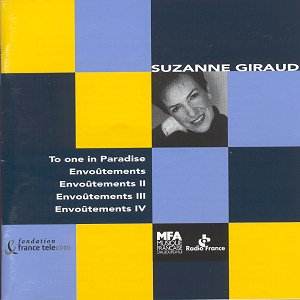Suzanne Giraud studied in Strasbourg and later at the
Conservatoire National Supérieur de Musique in Paris. She also
worked with Hugues Dufourt and Tristan Murail, and attended master classes
at G.R.M. and IRCAM. In the late 1980s she met and befriended Giacinto
Scelsi. She was awarded a scholarship from the Accademia Chigiana di
Sienna which enabled her to study with Franco Donatoni. She also stayed
repeatedly in Darmstadt where she met Morton Feldman, Brian Ferneyhough
and Wolfgang Rihm. Though all these composers had Ė in one way or another
Ė some influence on her making as a composer, she nevertheless managed
to remain her own self and to forge her own style. All the pieces recorded
here provide for a comprehensive survey of her musical output so far.
No matter how demanding or complex it may be, i.e. from the performerís
point of view, Giraudís music is immediately appealing. Some literary
or extra-musical stimulus often fires the composerís imagination in
writing works that reflect her personal experience, be it purely musical
or of a more intimate nature as is the case in To One in Paradise.
She always finds some subtle, poetic way to communicate her innermost
vision. This is undoubtedly her most endearing quality, i.e. by judging
from the works recorded here.
In 1996 Suzanne Giraud composed Envoûtements
for Irvine Arditti. This fairly long, technically demanding but very
imaginative fantasy in several contrasted sections (which the composer
refers to as "circles") became the first of an on-going series
of similarly titled pieces, the number then referring to the number
of players involved. (At the time of writing, the last piece in that
series is Envoûtements V for guitar and string quartet
which has recently received its first performance.) So, Envoûtements
II (1997) is for alto flute and marimba, and is again a free
fantasy evoking (pace the composer) witchcraft. The technical
demands put on the players are enormous, though never gratuitously so,
but the musical results are nevertheless very rewarding. Envoûtements
III, also from 1997, for soprano, clarinets (one player) and
percussion, sets a poem by Jeremy Darke, a British poet living in Paris.
The "circles" here reflect the various moods of the text and
thus acquire a greater formal freedom, though the overall outline of
the piece roughly resembles that of the earlier Envoûtements.
Envoûtements IV of 1997 was written for and first
performed by the Arditti Quartet. (It is actually Giraudís second work
for string quartet, written 13 years after her first essay Regards
sur le Jardin díEros of 1984.) The four "circles"
of the pieces are more in the nature of loosely traditional movements,
though the whole still plays without break and is formally free.
The most recent work here is the beautiful orchestral
scena for mezzo-soprano and orchestra on a poem by Poe, To
One in Paradise, completed in 1999. This beautifully moving
piece is, I believe, a fine example of Suzanne Giraudís utterly lyrical
nature. Though written under deeply personal circumstances, To
One in Paradise is a warmly lyrical and expressive work of great
subtlety, delicacy and poetic insight. A real masterpiece on all counts.
As far as I can judge, these carefully prepared, dedicated
performances are excellent and serve this composer well.
Suzanne Giraudís music was new to me but I know that
I will be looking forward to hearing any new work of hers.
Hubert Culot


